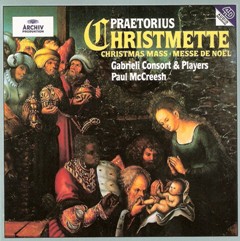111 Years of Deutsche Grammophon - CD 35
111 Years of Deutsche Grammophon - CD 35
Praetorius: Christmas Mass

Martin Luther (1483 - 1546) Christmas Mass - Processional:"Christum wir sollen loben schon" 1 arranged by Michael Praetorius / Har. Lucas Osiander [3:14] Michael Praetorius (1571 - 1621) 2 Puer natus in Bethlehem - Ein Kind geborn zu Bethlehem [7:29] 3 Kyrie (Missa: gantz Teutsch) - Polyhymnia caduceatrix (1619) - [4:31] 4 Gloria (Missa: gantz Teudsch) - Polyhymnia caduceatrix (1619) - [7:36] 5 Collect: "Der Herr sei mit euch" - Source (responses): Musae Sioniae VIII (1610) - [1:08] Anonymous 6 Epistle: "So schreibt der heilig Propheten Jesajas" [2:01] 7 Organ prelude: Praeambulum "Vom Himmel hoch" (Source: Lüneburg, Stadtarchiv, Musikabt., Mus.ant.pract.KN208.2) [1:09] Michael Praetorius (1571 - 1621) 8 Gradual hymn: "Vom Himmel hoch da komm ich her" - Musae Sioniae V (1607) / Urania (1613) [4:03] Anonymous 9 Gospel: "So schreibt der heilige Lukas" [3:51] Martin Luther (1483 - 1546) Credo: "Wir glauben all an einen Gott" (1524) - Tabulatur-Buch hundert geistl. Lieder u. Psalmen - 10 Harmonization: Samuel Scheidt [5:12] Anonymous 11 Organ prelude: "Resonet in laudibus" source: Lüneburg, Stadtarchiv, Musikabt., Mus.ant.pract.KN208.2 [1:09] Michael Praetorius (1571 - 1621) 12 Pulpit hymn: "Quem pastores laudavere" Source: Puericinium (1621) [4:36] Johann Hermann Schein (1586 - 1630) 13 Sonata: Padouana a 5 - Banchetto musicale (Leipzig, 1617) [3:04] Anonymous 14 The Lord's Prayer: "Vater unser, der du bist im Himmel" Words of Institution: "Unser Herr Jesus Christus" [2:35] Michael Praetorius (1571 - 1621) 15 Sanctus motet: "Jesaja dem Propheten das geschah" Source: Polyhymnia caduceatrix (1619) [6:25] Samuel Scheidt (1587 - 1654) 16 Organ prelude: "Wie schön leuchtet der Morgenstern" - "Görlitzer Tabulatur-Buch" (1650) - [1:35] Michael Praetorius (1571 - 1621) 17 Communion motet: "Wie schön leuchtet der Morgenstern" - Polyhymnia caduceatrix (1619) – [3:26] 18 Communion motet: "Uns ist ein Kindlein heut geborn" - Musae Sioniae VI (1609) - [2:11] 19 Post-Communion: "Der Herr sei mit euch" - Musae Sioniae VIII (1610) - [1:19] 20 Benediction: "Der Herr segne dich und behüte dich" - Missodia Sionia (1611) - [1:02] 21 Final hymn: "Puer nobis nascitur" - Musae Sioniae VI (1609) - [2:56] 22 Organ voluntary: "Nun lob mein Seel" [3:04] 23 Recessional: "In dulci jubilo" - Polyhymnia caduceatrix (1619) - [5:23] Susan Hemington Jones, Tessa Bonner, Mark le Brocq, Kristian Olesen, Finn Evald, Anton Pauw, Sarah Pendlebury, Hannelore Devaere, Julian Podger, Angus Smith, Simon Grant, Lasse Overgaard Nielsen, Asser Oppfeldt, Rune Tonsgaard Sorensen, Anders Engberg-Pedersen, Timothy Roberts, Raimund Nolte, Constanze Backes, Finn Evald Boy's Choir Of Roskilde Cathedral Kristian Olesen – chorus master Gabrieli Players, Gabrieli Consort Paul McCreesh - conductor
Michael Praetorius was not only one of the most versatile and prolific German composers of the early seventeenth century (only the remarkable, slightly younger Heinrich Schütz is of comparable importance) but also the author of Syntagma musicum, a historically significant theoretical treatise on music. The exact year of Praetorius' birth remains unknown; February 15, 1571, is the generally accepted date, selected on the basis of two contemporary sources which claim that Praetorius died on his 50th birthday. After schooling at the University of Frankfurt an der Oder and at the Lateinschule at Zerbst, Anhalt, during his teens, Praetorius was appointed organist of St. Marien Church in Frankfurt in 1587. Praetorius later wrote that he left the position after three years, and, while it remains unclear what his activities during the early 1590s might have been, by 1595 he reappears in the historical record as organist for Duke Heinrich Julius of Brunswick-Wolfenbüttel. After 1604, Praetorius combined his duties as organist with the more demanding position of kapellmeister at the court, often traveling with the duke and his court musicians. The following several years were a very productive time during which most of the composer's published collections of music appeared.
After Duke Heinrich Julius' death in 1613 Praetorius, though officially still attached to the new Duke at Wolfenbüttel, was invited to serve for two years at the court of Elector John Georg of Saxony, and he maintained a close relationship with the Saxony court even after the appointment ended. Indeed, from 1615 on, Praetorius spent more time away from Wolfenbüttel than he did attending to his duties as kapellmeister, and by 1620 Praetorius' frequent absence and poor health had caused so drastic a decline in the quality of music at Wolfenbüttel that he was dismissed from the position. He died just one year later, leaving his sizeable fortune to charity.
Praetorius' father and grandfather were both Lutheran theologians, and the composer inherited their deep religious sentiment, composing over 1,000 sacred compositions based on Protestant hymns and the Latin liturgy used in the Lutheran service. By comparison, only one small collection of secular compositions -- a group of instrumental dances -- survives. While such early works as Megalynodia Sionia, a collection of parody madrigals based on the music of Orlando di Lassus, among others, fail to display a real individuality of musical style. By the time of the Polyhymnia caduceatrix of 1619, Praetorius had embraced a remarkably forward-looking musical aesthetic in which the highly ornamented Italian vocal style of the times, and a dense scoring employing as many as 16 voices are all expressive possibilities at his disposal. Praetorius' Syntagma musicum, while never completed (the final section, intended to provide instruction in actual composition, remains missing), is one of the most important systematic compilations of early seventeenth century musical thinking. --- Blair Johnston, Rovi








